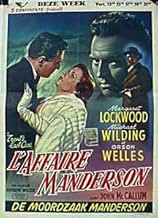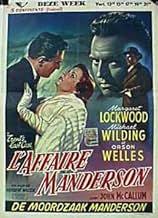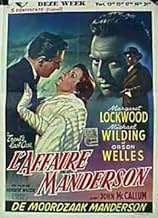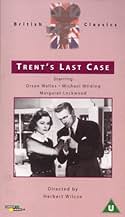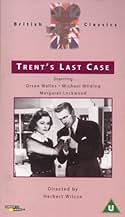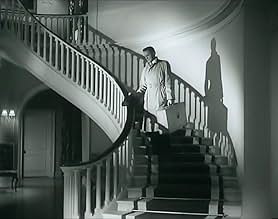IMDb-BEWERTUNG
6,0/10
642
IHRE BEWERTUNG
Füge eine Handlung in deiner Sprache hinzuA reporter investigates a rich businessman's death. While police rule it suicide, Trent believes it's murder and grows intrigued by the widow and secretary.A reporter investigates a rich businessman's death. While police rule it suicide, Trent believes it's murder and grows intrigued by the widow and secretary.A reporter investigates a rich businessman's death. While police rule it suicide, Trent believes it's murder and grows intrigued by the widow and secretary.
- Regie
- Drehbuch
- Hauptbesetzung
Geoffrey Bayldon
- Reporter in Court
- (Nicht genannt)
Ernest Blyth
- Concert Attendee
- (Nicht genannt)
Robert Cawdron
- Police Constable
- (Nicht genannt)
John Chandos
- Tim O'Reilly
- (Nicht genannt)
Anthony Collins
- Conductor
- (Nicht genannt)
Henry Edwards
- Coroner
- (Nicht genannt)
Eileen Joyce
- Pianist
- (Nicht genannt)
Ben Williams
- Jimmy - Reporter
- (Nicht genannt)
Kenneth Williams
- Horace Evans
- (Nicht genannt)
Empfohlene Bewertungen
This viewer is not exactly a devotee of the films of Herbert Wilcox but this one is not at all bad. E. C. Bentley had intended his novel to be a parody and although Wilcox has chosen to play it straight one cannot actually take it too seriously. This director's notable lack of flamboyance happens to suit this rather innocuous, teddibly civilised period piece very well.
It is presented by Republic Pictures for whom Orson Welles had made his bizarre 'Macbeth.' One is intrigued by his third billing and eagerly awaits his appearance. It is certainly worth the wait as his Mephistophelian presence and basso profundo are absolutely magnetic. It seems as if we are suddenly in an entirely different film and one is hardly surprised to learn that Welles wrote and directed his own scenes!
As for the rest of the film we have the debonair Michael Wilding, certainly no stranger to Wilcox, who is well cast as Bentley's engaging amateur sleuth of the title. Playing the widow of the millionaire who is assumed to have committed suicide, although Trent suspects foul play, is Margaret Lockwood. It is far more difficult to play 'good' than 'bad' and Miss Lockwood is more effective when playing the latter. The same comment would also apply to John McCallum as the prime suspect. The delightful Miles Malleson is, well.....Miles Malleson!
There is splendid use made of the Larghetto from Mozart's C minor piano concerto which suits the melancholy mood of the film.
By far the best scene(surprise, surprise) is one directed and wonderfully lit by Welles in which he and John McCallum discuss Shakespeare's depiction of a husband's jealousy in 'Othello'. Welles remarks that he had recently seen this play performed at St. James's Theatre and was none too keen on the leading actor. He is of course referring to, yes, you've guessed it........ himself!
It is presented by Republic Pictures for whom Orson Welles had made his bizarre 'Macbeth.' One is intrigued by his third billing and eagerly awaits his appearance. It is certainly worth the wait as his Mephistophelian presence and basso profundo are absolutely magnetic. It seems as if we are suddenly in an entirely different film and one is hardly surprised to learn that Welles wrote and directed his own scenes!
As for the rest of the film we have the debonair Michael Wilding, certainly no stranger to Wilcox, who is well cast as Bentley's engaging amateur sleuth of the title. Playing the widow of the millionaire who is assumed to have committed suicide, although Trent suspects foul play, is Margaret Lockwood. It is far more difficult to play 'good' than 'bad' and Miss Lockwood is more effective when playing the latter. The same comment would also apply to John McCallum as the prime suspect. The delightful Miles Malleson is, well.....Miles Malleson!
There is splendid use made of the Larghetto from Mozart's C minor piano concerto which suits the melancholy mood of the film.
By far the best scene(surprise, surprise) is one directed and wonderfully lit by Welles in which he and John McCallum discuss Shakespeare's depiction of a husband's jealousy in 'Othello'. Welles remarks that he had recently seen this play performed at St. James's Theatre and was none too keen on the leading actor. He is of course referring to, yes, you've guessed it........ himself!
Michael Wilding takes up "Trent's Last Case" in this 1952 film directed by Herbert Wilcox for Republic Studios. It's British with a British cast that includes Margaret Lockwood, John McCallum, Hugh McDermott, and one American, Orson Welles, who was probably trying to raise money for a project.
Trent is an artist and also an amateur detective. He gets involved in the suicide of a wealthy man named Manderson, but as he investigates, it looks more and more like murder. One suspect stands out, but how to prove it?
Unlike many detectives in books and movies, Trent is fallible. This is a neat mystery with a few red herrings. I don't agree that it was dull; I think the story itself keeps the film going, as well as the attractive Michael Wilding. Wilding falls in with many of those tall, good-looking British actors from the '50s - Robert Flemying, Michael Rennie, etc., and probably wouldn't be well known here if he hadn't married Elizabeth Taylor. Nevertheless, he was quite urbane with a great voice and acquits himself well as Trent. Margaret Lockwood is lovely as the victim's widow, and she keeps you guessing.
Not as bad as some reviewers claim. Maybe not as good either, but I enjoyed it. Orson Welles apparently had an obsession with using fake noses on his characters. It's really obvious in profile.
Trent is an artist and also an amateur detective. He gets involved in the suicide of a wealthy man named Manderson, but as he investigates, it looks more and more like murder. One suspect stands out, but how to prove it?
Unlike many detectives in books and movies, Trent is fallible. This is a neat mystery with a few red herrings. I don't agree that it was dull; I think the story itself keeps the film going, as well as the attractive Michael Wilding. Wilding falls in with many of those tall, good-looking British actors from the '50s - Robert Flemying, Michael Rennie, etc., and probably wouldn't be well known here if he hadn't married Elizabeth Taylor. Nevertheless, he was quite urbane with a great voice and acquits himself well as Trent. Margaret Lockwood is lovely as the victim's widow, and she keeps you guessing.
Not as bad as some reviewers claim. Maybe not as good either, but I enjoyed it. Orson Welles apparently had an obsession with using fake noses on his characters. It's really obvious in profile.
I was pleasantly surprised by this film. I fail to understand why so many people have criticized it. I thought the entire peace of work was brilliant! Orson Welles gives a stirring and chilling performance as an insane cynical business man. I especially loved the fact that his presence remains quite strong through out the entirety of the film. The story reeks of the talent of Orson Welles. I am surprised that he did not direct the peace himself. We follow the story of a young new reporter looking for the story of a life time. He finds such a story within the home of a black widow, brilliantly played by Margret Lockwood. As i have stated many times, Margret Lockwood never ceases to amaze me with her subtle, but layered performances. She manages here to evoke a certain dismalness that cannot go unnoticed. She plays a rather mellow and unfeeling part. Frankly, her character is really not all that interesting. Margret plays her part well, but the part is very limited. The main focus is the character of Trent, a savvy and sly man who will stop it nothing to find the truth. This film is a classic murder mystery, produced in a citizen Kane manner. The flash back sequences are very well crafted, as well the plot and story structure. The other characters are also quite interesting. The character of Marlow is perhaps the victim of this tale and probably the most sympathetic of all characters. However,the ending is rather cliché and slightly destroys the tone of the film. I do recommend this film though on so many levels. If you want a good mystery story, as well as some good acting, then sit back and enjoy!
It's good news for Welles completists that this, the better of the two films he made for Herbert Wilcox in 1952 (to help finance his on-off-on but finally magnificent film of 'Othello') is now available on DVD, though dismally free of extras. As a thriller it is a puzzle almost devoid of suspense, though there are some clever twists at the end. There are polished performances by Margaret Lockwood, John McCallum, Michael Wilding as the classy sleuth Trent, Miles Malleson in one of his best roles and Welles. Welles appears for no more than 20 minutes, in flashback, but, with his formidable false nose, is an intimidating presence as the late Sigsbee Manderson. In a fraught dialogue with McCallum he talks about 'Othello' and the production he's recently seen: "Didn't like the leading actor!" The leading actor was Welles himself, performing at the St James' theatre - a performance I was privileged have seen a year or two earlier, when Ken Tynan, long before PC was thought of, headed his review 'Citizen Coon'!
Agatha Christie considered this intrigue one of the best ever written, and it certainly is. The mystery is deep here, and as it gradually is unravelled you are in for any number of surprises. The actors are outstanding, with Michael Wilding as the detective intruding on the private lives of the young widow Margaret Lockwood and the man who loves her, who is the prime suspect, while Orson Welles as the victim provides an impressing finale as he enters in the final flashback. Miles Malleson plays an important part as a reluctant participant in the plot, while the story is what really matters. Herbert Wilcox' direction is faultless but very formal, giving the film a somewhat conventional character - there is no cinematography to speak of, while music plays an important part - Eileen Joyce has a moment as a performing pianist, and the film score is by Anthony Collins, who is also seen acting as a conductor - one of his rare appearances on film. After having reached the end of the story, and Michael Wilding closing his last case as Trent, yuo just have to agree with Agatha Christie about the marvellous windings of this plot.
Wusstest du schon
- WissenswertesIn the film, Sigsbee Manderson (played by Orson Welles) mentions a performance of Shakespeare's "Othello" at the St. James Theatre in London in 1951, in which he disliked the leading actor's performance. This is an in-joke: Welles himself played Othello at the St. James in 1951, under his own direction. Peter Finch played Iago opposite him.
- PatzerDuring the coroners inquest, Trent was seen drawing a sketch of Marlowe. This is not allowed in English Courts. Although court artists are allowed in as members of the public, all drawings must be done by memory outside the courtroom.
- Zitate
Margaret Manderson: He talks of reopening the case.
John Marlowe: You should've ordered him out of the house.
Margaret Manderson: And confirm his suspicions?
- SoundtracksPiano Concerto in C Minor
Music by Wolfgang Amadeus Mozart (as Mozart)
Arranged and Conducted by Anthony Collins (uncredited)
Performed by Eileen Joyce
Top-Auswahl
Melde dich zum Bewerten an und greife auf die Watchlist für personalisierte Empfehlungen zu.
Details
- Laufzeit
- 1 Std. 30 Min.(90 min)
- Farbe
- Seitenverhältnis
- 1.37 : 1
Zu dieser Seite beitragen
Bearbeitung vorschlagen oder fehlenden Inhalt hinzufügen

